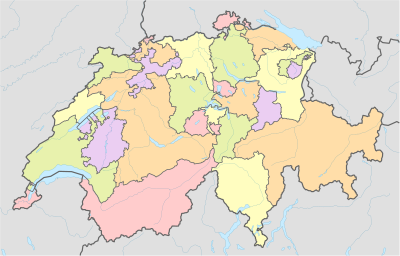
Back Switserse kantons Afrikaans Kanton ALS Cantons de Suiza AN كانتونات سويسرا Arabic Kanton (İsveçrə) Azerbaijani Kanton BAR Кантони на Швейцария Bulgarian Kantonioù Suis Breton Kantoni u Švicarskoj BS Cantons de Suïssa Catalan
| Swiss cantons Schweizer Kantone (German) Cantons suisses (French) Cantoni svizzeri (Italian) Chantuns svizras (Romansh) | |
|---|---|
| |
| Category | Federated state |
| Location | Switzerland |
| Found in | Regions |
| Created |
|
| Number | 26 cantons (as of 1999) |
| Populations | 16,003 (Appenzell Innerrhoden) – 1,487,969 (Canton of Zürich) |
| Areas | 37 km2 (14 sq mi) – 7,105 km2 (2,743 sq mi) |
| Government | |
| Subdivisions | |
| This article is part of a series on the |
 |
|---|
|
|
The 26 cantons of Switzerland[1] are the member states of the Swiss Confederation. The nucleus of the Swiss Confederacy in the form of the first three confederate allies used to be referred to as the Waldstätte. Two important periods in the development of the Old Swiss Confederacy are summarized by the terms Acht Orte ('Eight Cantons'; from 1353 to 1481) and Dreizehn Orte ('Thirteen Cantons', from 1513 to 1798).[2]
Each canton of the Old Swiss Confederacy, formerly also Ort ('lieu/locality', from before 1450), or Stand ('estate', from c. 1550), was a fully sovereign state with its own border controls, army, and currency from at least the Treaty of Westphalia (1648) until the establishment of the Swiss federal state in 1848, with a brief period of centralised government during the Helvetic Republic (1798–1803). The term Kanton has been widely used since the 19th century.[3]
The number of cantons was increased to 19 with the Act of Mediation (1803), with the recognition of former subject territories as full cantons. The Federal Treaty of 1815 increased the number to 22 due to the accession of former associates of the Old Swiss Confederacy. The canton of Jura acceded as the 23rd canton with its secession from Bern in 1979.[4] The official number of cantons was increased to 26 in the federal constitution of 1999, which designated former half-cantons as cantons.
The areas of the cantons vary from 37 km2 (15 sq. mi.) (Basel-Stadt) to 7,105 km2 (2743 sq. mi.) (Grisons); the populations (as of 2018) range from 16,000 (Appenzell Innerrhoden) to 1.5 million (Zürich).
- ^ (German: Kanton [kanˈtoːn] ⓘ; French: canton [kɑ̃tɔ̃] ⓘ; Italian: cantone [kanˈtone]; Sursilvan and Surmiran: cantun; Vallader and Puter: Chantun; Sutsilvan: cantùn; Rumantsch Grischun: chantun)
- ^ rendered "the 'confederacy of eight'" and "the 'Thirteen-Canton Confederation'", respectively, in: "Chronology" (official site). Bern, Switzerland: The Swiss Federal Administration. Retrieved 24 June 2018.
- ^ Andreas Kley: Kantone in German, French and Italian in the online Historical Dictionary of Switzerland, 13 April 2016. "Die Bündnispartner der frühen Eidgenossenschaft wurden im 14. Jh. meist als Städte und Länder, ab der 1. Hälfte des 15. Jh. immer mehr als Orte bezeichnet."
- ^ François Schifferdecker, François Kohler: Jura (canton) in German, French and Italian in the online Historical Dictionary of Switzerland, 20 July 2015.
